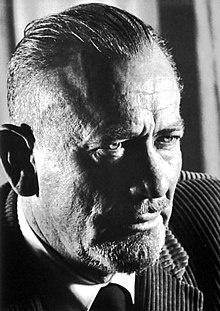Steinbeck Country
| John Steinbeck | |
|---|---|

Steinbeck in Sweden during his trip to accept the Nobel Prize for Literature in 1962
|
|
| Born | John Ernst Steinbeck, Jr. February 27, 1902 Salinas, California, U.S. |
| Died | December 20, 1968 (aged 66) New York City, U.S. |
| Occupation | Novelist, short story writer, war correspondent |
| Notable works |
Of Mice and Men (1937) The Grapes of Wrath (1939) East of Eden (1952) |
| Notable awards |
Pulitzer Prize for Fiction (1940) Nobel Prize in Literature (1962) |
| Spouses |
Carol Henning (m. 1930; div. 1943) Gwyn Conger (m. 1943; div. 1948) Elaine Scott (m. 1950) |
| Children |
John Steinbeck IV (1946–1991) Thomas Steinbeck (1944–2016) |
|
|
|
| Signature | |
John Ernst Steinbeck, Jr. (/ˈstaɪnbɛk/; February 27, 1902 – December 20, 1968) was an American author. He won the 1962 Nobel Prize in Literature "for his realistic and imaginative writings, combining as they do sympathetic humour and keen social perception". He has been called "a giant of American letters", and many of his works are considered classics of Western literature.
During his writing career, he authored 27 books, including 16 novels, six non-fiction books, and two collections of short stories. He is widely known for the comic novels Tortilla Flat (1935) and Cannery Row (1945), the multi-generation epic East of Eden (1952), and the novellas Of Mice and Men (1937) and The Red Pony (1937). The Pulitzer Prize-winning The Grapes of Wrath (1939) is considered Steinbeck's masterpiece and part of the American literary canon. In the first 75 years after it was published, it sold 14 million copies.
Most of Steinbeck's work is set in central California, particularly in the Salinas Valley and the California Coast Ranges region. His works frequently explored the themes of fate and injustice, especially as applied to downtrodden or everyman protagonists.
...
Wikipedia
